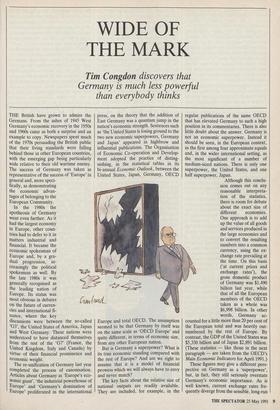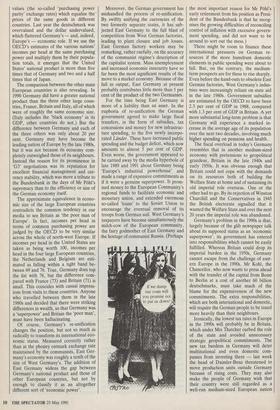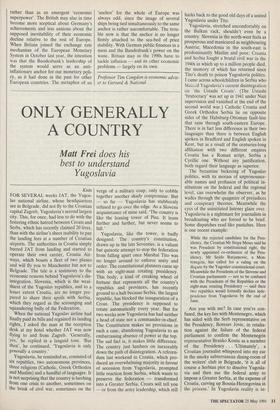WIDE OF THE MARK
Tim Congdon discovers that
Germany is much less powerful than everybody thinks
THE British have grown to admire the Germans. From the ashes of 1945 West Germany's economic recovery in the 1950s and 1960s came as both a surprise and an example to copy. Newspapers spent much of the 1970s persuading the British public that their living standards were falling behind those in other European countries, with the emerging gap being particularly wide relative to their old wartime enemy. The success of Germany was taken as representative of the success of 'Europe' in the economic advan- tages of belonging to the European Community.
In the 1980s the apotheosis of Germany went even further. As it had the largest economy in Europe, other coun- tries had to defer to it in matters industrial and financial. It became the economic spokesman of Europe and, by a gra- dual progression, in- creasingly the political The re-unification of Germany last year completed the process of canonisation. Articles about Germany as 'Europe's eco- nomic giant', 'the industrial powerhouse of Europe' and 'Germany's domination of Europe' proliferated in the international press, on the theory that the addition of East Germany was a quantum jump in the nation's economic strength. Sentences such as 'the United States is losing ground to the two new economic superpowers, Germany and Japan' appeared in highbrow and influential publications. The Organisation of Economic Co-operation and Develop- ment adopted the practice of disting- uishing, in the statistical tables in its bi-annual Economic Outlook, between the United States, Japan, Germany, OECD Europe and total OECD. The assumption seemed to be that Germany by itself was on the same scale as 'OECD Europe' and quite different, in terms of economic size, from any other European nation.
But is Germany a superpower? What is its true economic standing compared with the rest of Europe? And are we right to assume that it is a model of financial prowess which we will always have to envy and never match?
The key facts about the relative size of national outputs are readily available. They are included, for example, in the regular publications of the same OECD that has elevated Germany to such a high position in its commentaries. There is also little doubt about the answer. Germany is not an economic superpower. Instead it should be seen, in the European context, as the first among four approximate equals and, in the wider international setting, as the most significant of a number of medium-sized nations. There is only one superpower, the United States, and one half superpower, Japan.
Although this conclu- sion comes out on any reasonable interpreta- tion of the statistics, there is room for debate about the exact size of These figures may give a different pers- pective on Germany as a 'superpower', but, in fact, they still seriously overstate Germany's economic importance. As is well known, current exchange rates fre- quently diverge from the sensible, long-run values (the so-called 'purchasing power parity' exchange rates) which equalise the' prices of the same goods in different countries. Last year the deutschmark was overvalued and the dollar undervalued, which flattered Germany's — and, indeed, Europe's — economic role. If we use the OECD's estimates of the various nations' incomes per head at the same purchasing power and multiply them by their popula- tion totals, it emerges that the United States' national product is more than five times that of Germany and two and a half times that of Japan.
The comparison between the other main European countries is also revealing. In 1990 Germany did have a greater national product than the three other large coun- tries, France, Britain and Italy, all of which were of roughly the same economic size.
(Italy includes the 'black economy' in its GDP, other countries do not.) But the difference between Germany and each of the three others was only about 20 per cent. Germany may have become the leading nation of Europe by the late 1980s, but it was not because its economy com- pletely outweighed those of its neighbours.
Instead the reason for its prominence in `G3' negotiations was its reputation for excellent financial management and cur- rency stability, which was more a tribute to the Bundesbank in the days of Mr Pahl's supremacy than to the efficiency or size of the German economy itself.
The approximate equivalence in econo- mic size of the large European countries contradicts the common tendency in our media to see Britain as `the poor man of Europe'. In fact, incomes per head in terms of common purchasing power are judged by the OECD to be very similar across the whole of north-west Europe. If incomes per head in the United States are taken as being worth 100, incomes per head in the four large European countries, the Netherlands and Belgium are esti- mated as falling within a tight band be- tween 69 and 76. True, Germany does top the list with 76, but the difference com- pared with France (73) and Britain (71) is small. This coincides with casual impress- ions from visits to these countries. Anyone who travelled between them in the late 1980s and decided that there were striking differences in wealth, so that Germany was a `superpower' and Britain the `poor man', must have been hallucinating.
Of course, Germany's re-unification changes the position, but not so much as radically to transform its international eco- nomic status. Measured correctly rather than at the phoney ostmark exchange rate maintained by the communists, East Ger- many's economy was roughly a tenth of the size of West Germany's. The addition of East Germany widens the gap between Germany's national product and those of other European countries, but not by enough to classify it as an altogether different sort of 'economic power'. Moreover, the German government has mishandled the process of re-unification. By swiftly unifying the currencies of the two formerly separate states, it has sub- jected East Germany to the full blast of competition from West German factories, leading to plant closure and job losses. East German factory workers may be remarking, rather ruefully, on the accuracy of the communist regime's description of the capitalist system. Mass unemployment and increased economic insecurity have so far been the most significant results of the move to a market economy. Because of the fall in output, East Germany at present probably contributes little more than 5 per cent of the product of the two Germanies.
For the time being East Germany is more of a liability than an asset. In the euphoria of re-unification the German government agreed to make large fiscal transfers, in the form of subsidies, tax concessions and money for new infrastruc- ture spending, to the five newly incorpo- rated Lander. These have increased public spending and the budget deficit, which now amounts to almost 5 per cent of GDP. Even worse, the government appeared to be carried away by the media hyperbole of late 1989 and 1991 about Germany being `Europe's industrial powerhouse' and made a range of expensive commitments as if it were a genuine superpower. It prom- ised money to the European Community's regional funds to facilitate economic and monetary union, and extended enormous so-called 'loans' to the Soviet Union to encourage the eventual removal of its troops from German soil. West Germany's taxpayers have become simultaneously the milch-cow of the European community, the fairy godmother of East Germany and the hostage of communist Russia. (Perhaps the most important reason for Mr Pahl's early retirement from his position as Presi- dent of the Bundesbank is that he recog- nises the growing difficulties of reconciling control of inflation with excessive govern- ment spending, and did not want to be around to sort out the mess.) There might be room to finance these international pressures on German re- sources if the more humdrum domestic elements in public spending were about to fall. But, on the contrary, the medium- term prospects are for these to rise sharply. Even before the hand-outs to obsolete East German factories, West Germany's indus- tries were increasingly reliant on state aid in the late 1980s. Government subsidies are estimated by the OECD to have been 2.3 per cent of GDP in 1988, compared with 1.3 per cent of GDP in Britain. A yet more substantial long-term problem is that Germany will experience a marked in- crease in the average age of its population over the next two decades, involving much higher spending on pensions and health.
The fiscal overload in today's Germany resembles that in another medium-sized economy with pretensions to geopolitical grandeur, Britain in the late 1940s and early 1950s. It was obvious enough that Britain could not cope with the demands on its resources both of building the Welfare State at home and of sustaining its old imperial role overseas. One or the other had to go. By its rejection of Winston Churchill and the Conservatives in 1945 the British electorate signalled that it wanted the Welfare State and over the next 20 years the imperial role was abandoned.
Germany's problem in the 1990s is that, largely because of the glib newspaper talk about its supposed status as an 'economic superpower', its government has entered into responsibilities which cannot be easily fulfilled. Whereas Britain could drop its imperial burden in the 1950s, Germany cannot escape from the challenge of east- ern Europe in the 1990s. Mr Kohl, the Chancellor, who now wants to press ahead with the transfer of the capital from Bonn to Berlin at a cost of another 60 billion deutschmarks, must take much of the blame for the expensiveness of the new commitments. The extra responsibilities, which are both international and domestic, will require the German people to be taxed more heavily than their neighbours.
Ironically, the lowest tax rates in Europe in the 1990s will probably be in Britain, which under Mrs Thatcher curbed the role of the state and avoided unnecessary strategic geopolitical commitments. The new tax burdens in Germany will deter multinational and even domestic com- panies from investing there — last week the head of Daimler-Benz threatened to move production units outside Germany because of rising costs. They may also make the people of Germany wish that their country were still regarded as a well-run medium-sized European nation rather than as an emergent 'economic superpower'. The British may also in time become more sceptical about Germany's achievements and less anxious about the supposed inevitability of their economic decline relative to the rest of Europe. When Britain joined the exchange rate mechanism of the European Monetary System in October last year, the intention was that the Bundesbank's leadership of the system would serve as an anti- inflationary anchor for our monetary poli cy, as it had done in the past for other European countries. The metaphor of an `anchor' for the whole of Europe was always odd, since the image of several ships being tied simultaneously to the same anchor is rather uncomfortable. The trou- ble now is that the anchor is no longer firmly attached to the sea-bed of price stability. With German public finances in a mess and the Bundesbank's power on the wane, Britain may in the 1990s have to tackle inflation — and its other economic problems — largely on its own.
Professor Tim Congdon is economic advis- er to Gerrard & National.




















































 Previous page
Previous page